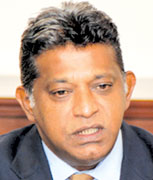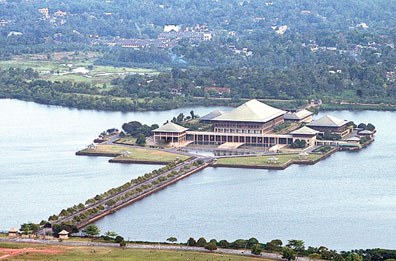|
19th Amendment:
Getting there!
By Dr. Paikiyasothy Saravanamuttu
 |
|
Dr. Paikiyasothy
Saravanamuttu
Pic: Courtesy frontlinedefenders.org |
The Supreme Court has communicated its determination on the 19th
Amendment to the Speaker, needing a referendum in respect of certain
provisions, which the government will jettison from the amendment as per
its promise to bring in constitutional reform that does not need a
referendum, within 100 days of the new presidency.
 The centerpiece of its election platform and of its governance reform
program is the diminution of the powers of the executive presidency and
a new balance of executive powers in favour of the Prime Minister and
Parliament. The centerpiece of its election platform and of its governance reform
program is the diminution of the powers of the executive presidency and
a new balance of executive powers in favour of the Prime Minister and
Parliament.
In this respect the Amendment is in the right direction and commences
what one hopes is a project of constitutional reform, which will result
in enduring democratic governance, peace and unity.
The rest of the project though, will fall to the next parliament as
this one is to be dissolved once the 19th Amendment is passed after the
Avurudu break.
One fervently hopes that the country will return a parliament
seriously committed and able to the task and that it will not be
terminated with the 19th Amendment as is. There has been a lot of
fulminating by what passes for the Opposition over the manner in which
the Amendment has been presented, conveniently forgetting the egregious
assault on process that was the 18th Amendment, which all of them
supinely, yet vociferously supported.
The process by which the 19th Amendment has been presented is less
than ideal and while the comparison with the 18th may be mildly
characterised as one between apples and oranges, it should not be
forgotten that they are both fruit.
The 100-day program perhaps has this government trapped into a
self-imposed deadline, which has resulted in it losing marks. The focus
of the debate on the Amendment and in the main of the determination of
the Court has been on the diminution of the powers of the executive
president.
In the public debate there are those who still maintain that the
executive presidency is pivotal for a strong State, the defence of
national sovereignty, political stability and economic development – the
defeat of the LTTE is cited as the ultimate proof of this.
History indicates otherwise – the executive presidency has presided
over two insurgencies since it was constituted, millions of dollars in
foregone investment and the erosion of democratic governance and
fundamental rights.
Important issue
It is also worth noting that an insurgency was put down under the
previous constitutional dispensation with a lot less bloodshed and
controversy.
The more important issue, therefore, is not the executive presidency
per se but the issue that has also featured in public debate of
transferring the executive powers of the President to the Prime
Minister.
In this context it is worth further noting that debates about
'executive prime ministers' have abounded in Britain for instance where
holders of that office of relatively recent vintage such as Thatcher and
Blair have been accused of being more presidential than primus inter
pares as the Prime Minister is traditionally supposed to be.
Furthermore, it is decades since a former Lord Chancellor, Lord
Hailsham, referred to the system of government in Britain as one of an
'elective dictatorship' on account of the dominance of the executive and
the weakness of parliament.
Indeed if constitutional reform for democratic governance is to have
enduring effect, the committee system in parliament has to be
strengthened to ensure serious oversight, monitoring and accountability
of the executive. This awaits the next parliament.
The determination of the Court in respect of the powers of the
President and Prime Minster is that certain paragraphs of Clause 11 of
the Amendment need a referendum in addition to a special majority –
two-thirds - of Parliament.
These paragraphs deal with the Prime Minister being the head of the
Cabinet of Ministers, determining the number of Cabinet Ministers,
Ministries, assignment of subjects and functions to Ministers and the
Prime Minister making changes to the above.
Reality
The determination states that: In the absence of any delegated
authority from the President, if the Prime Minister seeks to exercise
the powers referred to in the aforesaid Clause, then the Prime Minister
would be exercising such powers which are reposed by the People to be
exercised by the Executive, namely, the President and not by the Prime
Minister. In reality, the Executive power would be exercised by the
Prime Minster from below and does not in fact constitute a power coming
from the above, from the President.
It further states: The President cannot relinquish his Executive
power and permit it to be exercised by another body or person without
his express permission or delegated authority… Thus permitting the Prime
Minister to exercise Executive power in relation to the six paragraphs
referred to above had to
be struck down as being in excess of authority and violative of
Article 3.
Article 3, an entrenched clause of the Constitution – i.e any Bill
for the amendment or for the repeal and replacement of or which is
inconsistent with any of its provisions, requires both a two thirds
majority in Parliament and approval at a referendum – reads:
...sovereignty is in the people and is inalienable. Sovereignty
includes the powers of government, fundamental rights and the franchise.
It would seem that in practice, the relationship between the
President and Prime Minister will be of critical importance.
The Prime Minister could presumably request the President to do what
is contained in these paragraphs and the President on the other hand
could refuse. Clause 6,
Article 33A (2) of the Amendment remains: The President shall, except
in the case of the appointment of the Prime Minister or as otherwise
required by the Constitution, act on the advice of the Prime Minister.
In what may have been intended to be a pithy 17-page determination,
the Court may nevertheless have been less than coherent in clarifying
the permissible constitutional bounds of the balance of powers sought by
the new political dispensation. As to what it will be, the New Year will
tell. |

